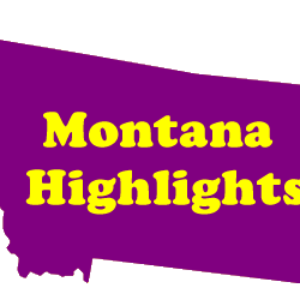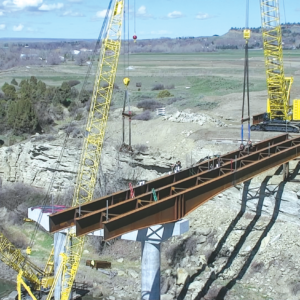The Long Range Transportation Plan (LRTP) for the Billings MPO (Metropolitan Planning Organization) is going through the final steps of being fully approved by the City of Billings, Yellowstone County, the Planning Board and the PCC (Policy Planning Committee which serves as the local MPO). The LRTP lays out the immediate and long term – – 20 years — transportation projects that are considered important by the community, and prioritizes them.
The estimated cost of the proposed and recommended projects for the Billings MPO total, from 2024-33, $443,062,726. From 2034-45 they total $491,140,675. The estimated available revenue ($1.251 billion) is greater than the estimated total costs ($934.2 million) to implement the committed and recommended projects for the 2023 LRTP, which means the plan is fiscally responsible.
The Draft 2023 LRTP, which was presented to, and approved by Yellowstone County Commissioners, last week, includes updates to current transportation conditions, forecasts future population impact on the transportation system, models future traffic volumes through to 2045, and includes transportation project priorities. It was prepared for the City of Billings by Kittelson & Assoc. and DOWL.
The lion’s share of the 416 projects included in the 20-year Billings MPO plan are for multi-use trails and bicycle trails with 86 multi-use trails and 124 bicycle trails. The next largest category is 81 roadway projects, which includes widening, reconstruction, space allocation, pavement preservation, signage, bridge rehabilitation, railroad crossings, pavement of gravel roads, etc.; followed by 56 intersection projects, which includes safety studies, new stop signs new traffic signals, new roundabout, turn lanes, ADA upgrades and interchange layouts. Fifteen Congestion Management projects are included, which involve signal timing signal equipment, signs and warning systems. There are 22 Safe Route to School projects which involve projects identified in the 2022 school plan update; followed by 18 transit projects with include transit facilities, improvement, bus replacements, electric vehicle charging stations, and other upgrades.
Of the 416 projects in the plan, 63 are committed projects which are already included as existing projects in the Montana STIP, the MPO TIP, or the City of Billings CIP. Projects prioritized as “recommended” are those expected to be fully funded by year 2045. Illustrative projects are not expected to be funded by 2045 due to fiscal constraint but could be included in the adopted Long Range Transportation Plan if additional resources become available.
Funding comes from a combination of sources including federal, state and local revenues. The report explains “As transportation technologies continue to evolve, funding sources that were once lucrative, such as gas taxes, may become less relevant. To supplement and eventually replace obsolete funding sources, there are several funding sources that are emerging, including congestion pricing, mileage-based fees, variable parking fees, and electric vehicle charging taxes.”
Charging tolls is an option for heavily used roadways to reduce demand and to raise revenue.
Another future source for more funding is Mileage-Based Fees — also known as “Vehicle Miles Traveled” (VMT) fees. This funding source charges drivers directly for each mile traveled, either through odometer readings at annual vehicle registrations or GPS-based systems. Oregon and California have piloted mileage-based systems since the 2000’s, and other states are considering them.
Variable Parking Fees are similar to congestion pricing, charging fees for vehicular parking based on location, availability, and the time of day.
Electric Vehicle Charging Tax is emerging as a funding source. It levies a tax on electricity delivered to public electric vehicle charging stations. The Montana State Legislature passed a kilowatt hours tax in 2023. The state is researching replacements for the gas tax. At present, the gas tax is the primary source of non-federal funding for roads.
The current annual allocation for the Billings#-Yellowstone County MPO is $65,587,858. The 22-year revenue projection is $1,251,530,000. Using the 22-year revenue projection, the average annual allocation is estimated at $56,880,000. The report stated that the average annual revenue projection is anticipated to increase due to changes in federal funding programs. “However, it is important to note that federal earmarks, which were a previous revenue source, are no longer expected.”
Among some of the significant projects likely to emerge in the nxt few years:
Roadway Projects:
—Downtown 2 Way Conversion of 2 way streets. The one way to two?way conversion moves toward a consistent network of two?way streets within downtown Billings. 2028, $7,400,000
— 21st Street Underpass Improvements. The 21st Street Underpass has a low clearance of only 8.5 feet, limiting the vehicles that can pass through this route. With the congestion of 27th nearby, the City will increase the clearance to standard minimum of 14 feet to provide a route for emergency vehicles or larger commercial vehicles, especially during train crossings on 27th. 2028, $11,850
—90 Incident Management will install variable message signs and road closure gates on Interstate 90 from Billings to Three Forks – will aid in communicating road conditions, accidents, or other important information about the roadway ahead. 2028, $5,600,000
— Wicks Lane – Main to Bitteroot design for the reconstruction of Wicks Lane and construction of sidewalks. Wicks Lane is an arterial that carries a volume of traffic that would be more efficient and safe if the road was reconstructed as a three lane section with multimodal facilities. 2028, $2,200,000
— Billings Bypass – Five Mile Road to US87 Construction of connection from Five Mile Road to US87, 2028, $16,207,400
— Inner Belt Loop Road Construction, 2028, $14,620,400
— 1st Avenue N – 9th to RR Crossing Major Reconstruction, 2028, $15,209,100
—Billings Bypass – Johnson Lane Interchange to RR Overpass Construction of connection from interchange to railroad overpass, 2028,$9,252,800
— Billings Bypass – Railroad Overpass Construction of new bridge over railroad, 2028, $5,301,800
Intersection Projects:
—Billings Bypass – Johnson Lane Interchange Reconstruction of existing interchange, 2028, $45,204,600
— Exposition Drive and 1st Avenue N. Intersection improvements, 2028, $10,221,500
— Zoo Drive Improvements – Safety improvements, 2028, $5,238,300
— Airport Road and Main Street – Billings Intersection improvements, 2028, $10,968,100
— Rimrock & 62nd St W Intersection Improvements – Roundabout, 2028, $7,545,300
— Lockwood Interchange – Billings Reconstruction of existing interchange to a diverging diamond design, 2045, $45,000,000
— West Billings Interchange Construct additional EB and WB mainline lanes through interchange, modify vertical curve, reconstruct bridge segments (Laurel Rd and Mullowney) and restripe WB off-ramp at West Billings Interchange, 2045, $26 million.
Congestion Management
—27th Street RRXing ITS Signage and Advanced Warning System, Implement a signage and advanced warning system on 27th Street to inform transportation users of crossing delays due to incoming and stopped trains, 2033, $671,958
Pedestrian:
—a pedestrian grade separated crossing across Exposition Drive between 1st Avenue North and 6th Avenue North in 2028, $4 million.
— Sidewalk on Old Hardin Rd between Becraft Ln and Dickie Rd, 2033, $1.9 million
— Highway 3 Pedestrian/ Bicycle Underpasses as needed for multi-use trail connection across Zimmerman Trail, and north-south connections across Highway 3 for future development. 2045, $2.2 million
Bicycle Trails:
— Terry Ave/ Howard Ave/ 24th St W. neighborhood bikeway, 2028, $240,000
— 1st Avenue N. Bicycle Lane from N 13th St. to N. 36th St, 2033, $111,229
— Minnesota/ 1st Ave S Bicycle Lane from N 13th St to State Ave., 2033, $198,127
— Montana Ave. Bicycle Lane from N 18th St to Division St., 2033, $115,574
— Jellison Rd Bicycle Lane from Blue Creek Rd to Aldona Rd, 2033, $68,649
Trail Projects:
—Skyline Trail Multi Use Path, 2028, $4,121,400
—Stagecoach Trail is an 8?foot wide shared use pathway approximately 5,300 lineal feet that will run on the east side of Zimmerman Trail from Rimrock Road to Highway 3. This trail is an essential part of the Marathon Loop and will provide a connection from the top of the Rimrocks to the valley. 2028, $3,500,000
—6th Ave N Multiuse Trail will add a trail on 6th Ave North from Exposition Drive to N 13th. 2028, $500,000
— 25th Street Pedestrian Bridge over the Railroad Tracks at 25th Street between Montana and Minnesota Avenues. 2028, $1,250,000
— Coburn Rd Multi-use Trail from Old Hardin Rd to South extent of Coburn Rd; spot improvement at Old Hardin Rd and at Rosebud Lane, 2045, $3,816,648
Transit Projects
—Metroplex expansion/ interior remodel, 2028, $1,600,000
— MET Transit Rollingstock/ Buses Replacement Vehicles, 2028, $4,045,600
— Fixed Route Redesign to provide a better rider experience across the service area without requiring more funding. The redesigned network would achieve this by revising parts of the current route network so that buses spend more time on corridors with high demand, by reducing or eliminating loops, and by providing improved connectivity between transit-oriented land uses






